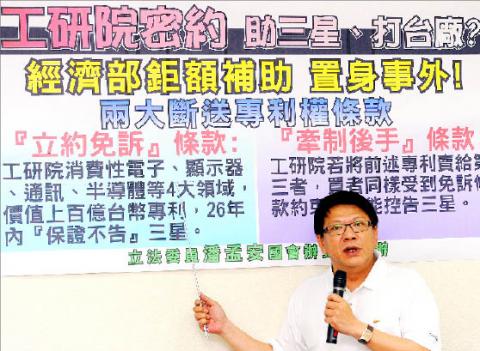The government-funded Industrial Technology Research Institute (ITRI, 工研院) denied yesterday that its patent lawsuit settlement with Samsung Electronics Co last year has negatively affected the interests of Taiwanese companies.
However, ITRI president Shyu Jyuo-min (徐爵民) refused to disclose the details of the settlement, citing confidentiality.
The ITRI’s denial came after Democratic Progressive Party (DPP) Legislator Pan Men-an (潘孟安) yesterday accused the Hsinchu-based research institute of signing unfair agreements with Samsung to settle several patent lawsuits, citing a report by the Chinese-language Wealth Magazine (財訊).

Photo: Chang Chia-ming, Taipei Times
The magazine reported that the settlement could affect patent rights that local companies, including flat panel maker AU Optronics Corp (友達光電), purchased from the institute.
In June and October of 2009, the ITRI filed a total of seven patent infringement lawsuits against Samsung and its US unit with a US court in Arkansas.
Citing the magazine report, Pan told a press conference yesterday that the ITRI settled the lawsuits with Samsung last year for less than NT$2 billion (US$70 million), while authorizing Samsung to use more than 100 of its patents.
However, under the settlement, the ITRI also signed an agreement with Samsung not to sue, agreeing not to pursue its patent claims against the South Korean firm in the fields of consumer electronics, flat-panel displays, -communications and semiconductors where the institute now owns patents or is applying for patents over the next six years, Pan said, citing the magazine report.
If the ITRI sells these patents to a third party, the third party should also not sue Samsung, according to the report.
Pan said the number of patents included in the covenant not to sue accounted for about two-thirds of the ITRI’s roughly 14,000 patents, worth more than NT$10 billion.
As these patents are valid for 20 years, the signing of the agreement not to sue would mean Taiwanese firms could not pursue patent claims against Samsung for the next 26 years, thus posing a huge threat to local electronics firms, Pan said.
Pan said he would ask the Ministry of Economic Affairs and the ITRI to submit a special report on the settlement to the legislature.
In response, Shyu said that the ITRI did not agree to sell patents involved in the settlement exclusively to Samsung when it reached the deal last year with the South Korean company, which is seen as a rival by local electronics companies. Nor did the ITRI ink any deal with Samsung on cross-licensing, he added.
In a statement, the ITRI described the accusation as “false” and said that it has continued to work closely with local companies in patent lawsuits and technology development.
The ITRI, which said it was considering taking legal action against Wealth Magazine, said the report has caused a “major impact” on the ITRI’s ongoing lawsuit against LG Electronics Inc of South Korea.

The US dollar was trading at NT$29.7 at 10am today on the Taipei Foreign Exchange, as the New Taiwan dollar gained NT$1.364 from the previous close last week. The NT dollar continued to rise today, after surging 3.07 percent on Friday. After opening at NT$30.91, the NT dollar gained more than NT$1 in just 15 minutes, briefly passing the NT$30 mark. Before the US Department of the Treasury's semi-annual currency report came out, expectations that the NT dollar would keep rising were already building. The NT dollar on Friday closed at NT$31.064, up by NT$0.953 — a 3.07 percent single-day gain. Today,

‘SHORT TERM’: The local currency would likely remain strong in the near term, driven by anticipated US trade pressure, capital inflows and expectations of a US Fed rate cut The US dollar is expected to fall below NT$30 in the near term, as traders anticipate increased pressure from Washington for Taiwan to allow the New Taiwan dollar to appreciate, Cathay United Bank (國泰世華銀行) chief economist Lin Chi-chao (林啟超) said. Following a sharp drop in the greenback against the NT dollar on Friday, Lin told the Central News Agency that the local currency is likely to remain strong in the short term, driven in part by market psychology surrounding anticipated US policy pressure. On Friday, the US dollar fell NT$0.953, or 3.07 percent, closing at NT$31.064 — its lowest level since Jan.

The New Taiwan dollar and Taiwanese stocks surged on signs that trade tensions between the world’s top two economies might start easing and as US tech earnings boosted the outlook of the nation’s semiconductor exports. The NT dollar strengthened as much as 3.8 percent versus the US dollar to 30.815, the biggest intraday gain since January 2011, closing at NT$31.064. The benchmark TAIEX jumped 2.73 percent to outperform the region’s equity gauges. Outlook for global trade improved after China said it is assessing possible trade talks with the US, providing a boost for the nation’s currency and shares. As the NT dollar

The Financial Supervisory Commission (FSC) yesterday met with some of the nation’s largest insurance companies as a skyrocketing New Taiwan dollar piles pressure on their hundreds of billions of dollars in US bond investments. The commission has asked some life insurance firms, among the biggest Asian holders of US debt, to discuss how the rapidly strengthening NT dollar has impacted their operations, people familiar with the matter said. The meeting took place as the NT dollar jumped as much as 5 percent yesterday, its biggest intraday gain in more than three decades. The local currency surged as exporters rushed to